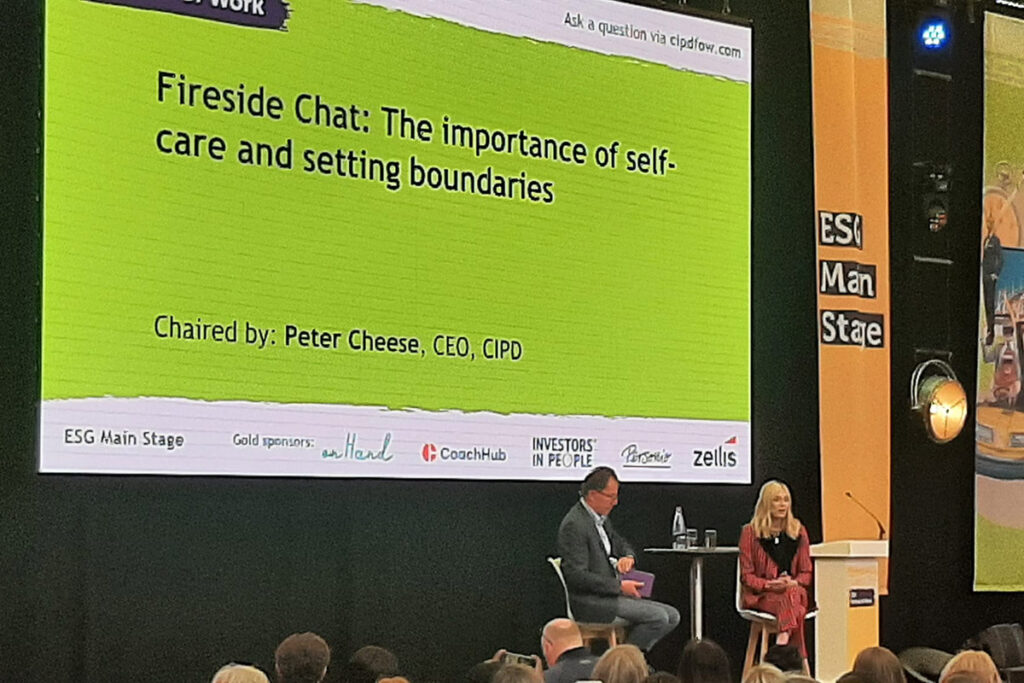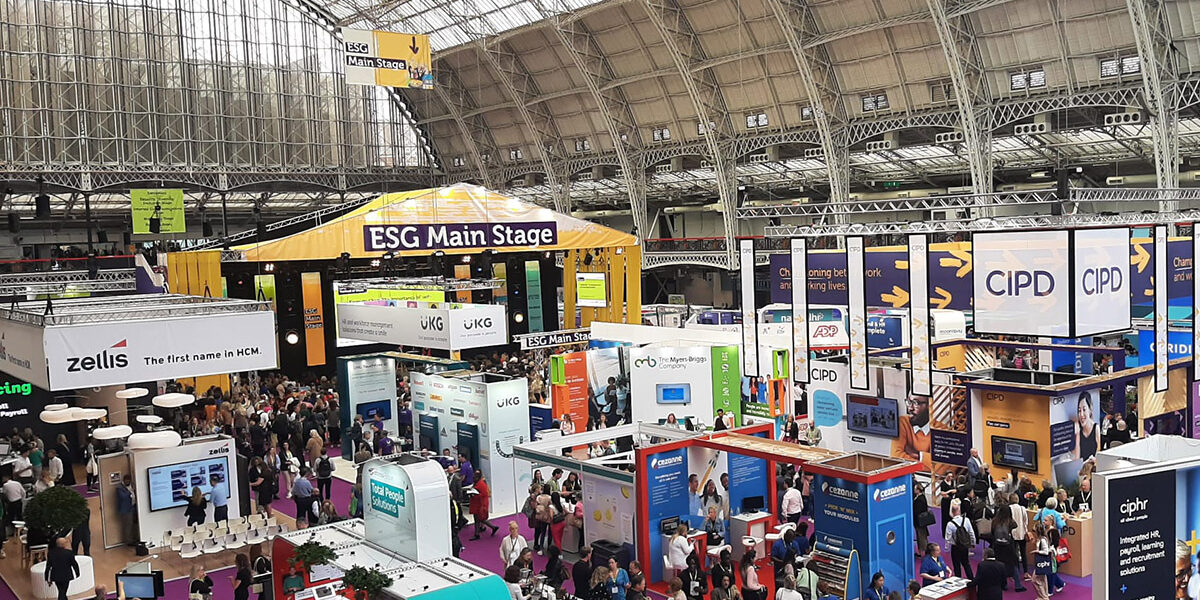This week I spent a day at the CIPD Festival of Work. It’s fantastic that the CIPD has put on a two-hall event at Olympia in London for free for the HR and people leader community. With 13,000 people registered to go along for the two-day event, I had to take a look to see what was being talked about. One of the interesting things is that this event is multi-disciplinary with all the people professions being represented with their own stages for each specialism. This is unlike the other events in the London HR calendar that focus in on one stream. This makes for a sensory overload when you turn up with a fast-beat brass band playing from the balcony and a huge turnout – in fact it took 20 minutes outside to queue to get in, but we didn’t care as it was the warmest day of the year so far in London and not raining – a good chance to network in the queue.
First up was Peter Cheese, CEO of the CIPD as the kick-off keynote. It is always good to hear from Peter as you get an idea of what this year’s focus will be from the CIPD. It was immediately apparent that the rapid advancement of AI and tech in the workplace was the main focus. Peter spoke about the HR community having to come together to understand and fully take on this challenge – “we have to do this together” and “embrace the technology”. He said the disruptive power of technology gives opportunities, highlights risks and a need to consider regulatory impact. A responsible business needs to be “people centric”, have environment social and governance (ESG), a multi-stakeholder approach, and focus on the 3 P’s – people, planet and prosperity.

In summary, Peter said we had to lead from purpose vision and values, drive agility, and reimagine structures processes and cultures. We need to embrace experimentation. Peter quoted Justin Trudeau’s Davos quote of 2018: “The pace of change has never been this fast, and it will never will be this slow again”. We need to become an evidence-based HR function that acts swiftly and learns quickly. A lot for the HR profession to focus on. As someone I sat next to said to me today, “is this the time for HR? Surely the ownership of AI has to sit with the HR function because where else would it sit?”.
Peter then interviewed Fearne Cotton, late entry guest speaker after the previous one pulled out at the last minute. Fearne was great at passionately speaking about her mental health experience, helping raise awareness of the many different and distinct challenges people are facing in 2023. Finally we are talking more about mental illnesses and not keeping them out of sight and silent as in the past, but Fearne said we need to act based on the specific need now that we are opening up, it’s not a one-size-fits-all.
Now we were off into the different stages to hear from the professional streams. I went to see the presentation by Talogy’s Daniel Adeline and Krithika Barcham about “Bias in AI – navigating the future of work”. This was a good intro into the world of ChatGPT as a source of AI. We heard about the UK’s first generative AI worker on LinkedIn called Avery Ingram (don’t believe me, check it out here: https://www.linkedin.com/in/avery-ingram-182974272/). We saw which HR tasks could be automated to a large extent through ChatGPT and AI. The presentation looked at the risks with AI – Bias, cheating, privacy and security, and ethical concerns with cheating in recruitment highlighted as already a challenge for us with generative AI. There was some interesting ChatGPT research from “textio” showing gender stereotypes generated by ChatGPT when asked for feedback about different job roles that ChatGPT was following the him vs her stereotypes, e.g. childminder vs construction worker.
This finished with a summary of the critical skills needed to be successful in the future of work: Critical thinking, EQ, Flexibility, Digital and data literacy. Overall, the presentation was a good intro to AI, but as the only AI presentation of the day I, and others around me, were expecting a deeper insight into the upcoming tech of AI to equip us as people professionals. After Peter Cheese’s call to action I was expecting more from the Festival of Work on AI. But then you need to remember that this is a fast-moving subject and these speakers were booked in months ago I expect.
After lunch I watched the presentation “Learning Transformation – What is slowing you down?” by Andy Lancaster of the CIPD and Laura Overton who has researched for the latest CIPD learning at work 2023 survey report. An interesting, fast-paced presentation hitting home that we need to align our learning agenda closely with the business agenda if we are to stay relevant. Andy said we need to talk skills as the skills agenda is a hot topic for business leaders. We need to adopt a performance consulting approach with curious questioning to demonstrate to the business that we, as L&D professionals, care about their business outcomes. Andy said he had 15 “go to” questions to really understand a business need, such as:
- What should be happening and what is happening?
- Is learning and training the best option to resolve this, or is there something else?
- What is the price of this if we do nothing? (My personal favourite)
Laura highlighted that to increase our capacity as L&D professionals, which is a major limiting issue, we need to embrace intelligent tools that can free us up into the higher-level thinking. Andy also reminded us of the successes we had during the pandemic of rolling out MVPs (minimum viable products) to get quick results – don’t let our need for perfectionism get in the way again! Rolling out a MVP also gets immediate learner feedback for the refining process giving a better product overall. Finally, we need to remember that line managers are our customers, but more importantly they are our allies and advocates in L&D so involve them. A great presentation!
My last observation of a presentation of the day was about analytics: “How to collect and interpret meaningful data” by Hayfa Mohdzaini from the CIPD and Andrew Stephenson, CPO of Equiniti. This was an intro presentation by Hayfa and then a question-and-answer session with Andrew.
Hayfa spoke about some of the barriers to using existing data: can’t easily access, don’t know how to analyse it, too much effort and the need to create dialogues with employees when asking for data: saying why you are asking for feedback, giving previous examples of action taken, and providing easily accessible sources so employees can ask questions. It was evident that the presentation was about collecting data through employee surveys as a primary methos and then using existing data sets as a analysis method to get insight.
Andy gave his examples of seeking data through survey using multimedia formats to nudge people to engage in surveys and give you the raw data you need. He spoke about it being important to find insight through analysis and demonstrating that you have acted on this before asking for more data. As Hayfa put it, “Data: Action: Data: Action…” which I quite liked. A good example from Andy was the hot topic of hybrid working. They asked their employees about how productive they felt in the hybrid world and them analysed this against swipe data from office access systems. The analysis showed that managers being in at least three days a week increased productivity. However, it didn’t seem to make any difference in productivity about how often employees were in the office. An interesting insight that others might want to look into. Overall, a solid presentation about best practice. There was again, however, a little disappointment that this key topic on data analysis and insight didn’t go a bit deeper.
I had a brief circuit of the exhibition between presentations and there was a good selection of new technologies breaking through, however I did feel a little confused with so many types of exhibitors all together. One key point is that the event was paperless, using only an app. The map on the app couldn’t be enlarged on my phone so I did feel a bit disorientated trying to understand who does what. I do like a paper plan so I can target who is who in the hall – but maybe that’s just my ESTJ Myers-Briggs type coming to the fore!
Overall, I have to say well done to the CIPD bringing such a vast event to the HR masses for FREE without any restrictions on access. It definitely got us together as a HR function to look at key issues – just what Peter Cheese wanted in his opening speech. I’m a bit gutted I couldn’t spare the time to visit for day 2!

